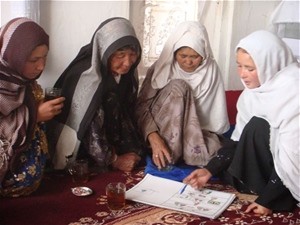
Female community health worker teaches Afghan mothers to improve hygiene in their homes through regular hand washing.
USAID/BASICS
Teaching mothers that simple hand washing will spare their households unnecessary illness
8 SEPTEMBER 2011 | TAKHAR, AFGHANISTAN
Many children in Afghanistan die each year of easily preventable diseases. Nearly 25 percent of those deaths are due to diarrhea. These frequent attacks of diarrhea are among the main causes of under-nutrition, which delays development and is implicated in over half of all childhood deaths.
One of the most effective ways of preventing diarrhea is to improve hygiene in the home, especially through regular hand washing with soap before preparing and eating food and after using the toilet or handling child’s feces. A USAID project is working with non-governmental organizations to train community health workers to teach families proper personal hygiene, especially hand washing. Because most family members in rural areas are illiterate, the community health workers use pictorial books to teach families. When visiting families, they discuss how improved hygiene and hand washing with soap can improve the health of all family members, and how and where to set up a place for washing hands in the home.
Nafeesa, a mother in Shingan village in Takhar Province, tells how she and her family have benefited from this simple intervention. "Before, my children were often getting sick, especially with diarrhea. But from the time Hajira, a community health worker, made a home visit and explained how to wash our hands properly, my children are much less sick than in past years."
Simple information clearly presented can have a large impact on the health of children. Teaching older children the importance of frequent hand washing can also have short- and long-term benefits. Girls often have to help their mother feed and care for the younger children. After they become mothers themselves, they will be able to share the good hygiene practices with the next generation.







Comment
Make a general inquiry or suggest an improvement.